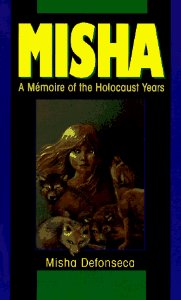Bring Facts to Life in Family History
Biff Barnes
Authenticity and truth are topics that frequently surface in our workshops and conversations with people working on family history books. As they talk about family stories they may comment, “Of course I’m not sure if it’s completely true,” or “I can’t really prove that.” As a consequence they shy away from including interesting and colorful stories in their books. That’s unfortunate. It’s also understandable as we are bombarded by a steady stream of “false memoirs.”
A memoir hoax is back in the news. Court House News Service reported that “A publishing company can sue a Belgian woman who wrote a bogus memoir about surviving the Holocaust and later won millions of dollars from the publishing company, the Massachusetts Court of Appeals ruled.”
The book, Misha: A Mémoire of the Holocaust Years, by Misha Defonseca was initially unmasked as a falsehood in 2008.

Blake Eskin summarized the book in Slate. He wrote, “Published in 1997, Misha is about a Jewish girl from Brussels who walked across Europe by herself during World War II and spent months living in the forest…Even if you forget for a moment that Defonseca has two prolonged encounters with wolves in war-torn Europe, her story strains credulity: She walks from Belgium to Ukraine, sneaks into and out of the Warsaw Ghetto, and stabs to death a Nazi rapist who attacks her—all between ages 7 and 11.”
Misha sold only about 5,000 copies in the United States. Disney had an option on the film rights but let it lapse. Oprah taped a segment with the author at a wolf preserve, but it never aired.
However, in France and Italy, the memoir sold more than 30,000 copies. French-Jewish filmmaker Véra Belmont made a feature film Survivre Avec les Loups, based on the memoir.
On the eve of the book’s exposure by the Brussels newspaper Le Soir as a fabrication Defonseca released a statement through her lawyer, "I told myself a life, another life. I apologize.” She said, the book "is not actual reality, but was my reality, my way of surviving."
[Note to the genealogists among us: It was genealogical research that proved that Defonseca’s story was untrue.]
What Defonseca and other “false memoirists” like James Frey did is fraudulent. They made up the whole thing. If their book had been shelved in the fiction section it would have been fine.
That’s a long way from a family historian using techniques borrowed from fiction to make a book more interesting. The family historian has a factual framework generated by his research which lays out the detailed records of ancestors’ lives. Bringing those ancestors to life by researching the historical context of the time and place they lived to help readers understand their experiences is a very legitimate way to help sharpen the story you are telling. Weaving family lore and stories passed down through the generations helps to create a more lively portrait of your ancestors. Looking at the factual record in an imaginative way to explore possible emotions, motivations or even dialogue which might have accompanied documented events are all valid tools to help characterize real people.
Family historians shouldn’t hesitate to make their books as colorful as they can by employing a variety of literary techniques. They have nothing to worry about regarding being truthful because their factual research is the framework for the entire book.
Click here to read Jeff Gorman’s article, Publisher Can Sue Over Holocaust Memoir Hoax
Click here to read Blake Eskin’s story, Crying Wolf: Why did it take so long for a far-fetched Holocaust memoir to be debunked? in Slate